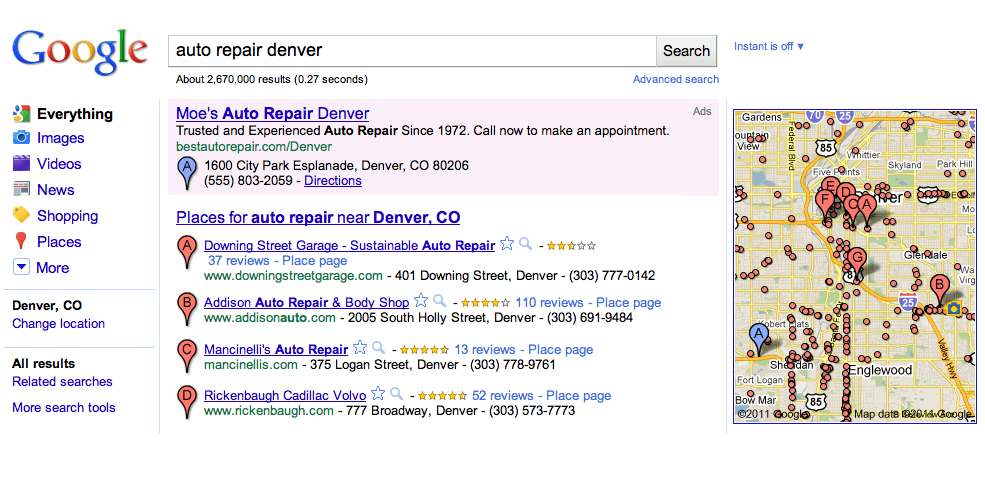How to Reach Local Customers Better In Your Online Advertising
by Casey Walrath • July 24, 2015
Imagine this scenario: You come home from a long day of work, only to find that you’ve had a pipe burst and your basement is flooded. Then you learn your air conditioner is broken and the electrical outlets to your TV shorted out.
Also, your kitchen is covered in ants. Now what?
Well, first you should make sure your home isn’t built on some kind of cursed burial ground. But then, if you’re me, you pull out your phone and start looking up plumbers, electricians, and pest control services.
If you’re one of those companies, it’s important that I see your business near the top of the search results page and have a compelling reason to call you instead of a competitor. As I tell my clients, Google is the new yellow pages, especially for people under 40. For any business trying to reach local customers, it’s critical to establish an online presence that appeals specifically to people within your service area. So let’s talk about a few ways to do that in my area of expertise, pay per click marketing (PPC) through Google AdWords.
1. Leverage Other Marketing Channels Through PPC
If I search for “pest control” and see three ads, two for companies I’ve never heard of and one that I’ve seen on a billboard around the corner, guess which one I’m likely to click on? Sorry, strangers, but I’m probably going for the brand I’m familiar with.
That means your PPC advertising needs to be integrated with your broader marketing strategy to reach local customers effectively. Whenever you launch a new marketing campaign outside of PPC–on Facebook, flyers, billboards, a radio spot, etc–take a look at how that affects your AdWords traffic. It’s hard to be 100% sure, especially with offline marketing, but remember PPC advertising tends to capture users at the very end of the buying funnel, right when they’re ready to convert, so it’s perfect for capturing leads after your other channels have created brand awareness.
If you’re advertising a $50 off special on your billboards, be sure your PPC ads reflect that. And be sure to bid on your branded keywords! Google serves ads above organic results, so even if your SEO has you in the top spot your competition might steal a few customers if you’re not bidding on your own brand in AdWords.
2. Use Google Location Extensions
Locations Extensions used to be managed within Google AdWords, but now they’re imported from Google My Business, meaning you’ll have to setup an account there. Once you’ve done that and linked it with AdWords, Google will show your location extensions to local users right in your ad text (image source)

3. Target Local Cities in Ads and Landing Pages
Whenever possible, I like to support local businesses over big nationwide ones. Your customers may or may not be so idealistic, but when your reach is limited and local, you’ll always be more effective if you can demonstrate that you’re close to your customers.
For example, let’s say I’m looking for a plumber in Broomfield, Colorado. To make sure I don’t get a company in another part of the state I might search for “plumber in broomfield.” That first result looks promising! It’s even better if the landing page also prominently mentions Broomfield to reinforce the local credentials.

There are a couple ways to setup local campaigns like this. One way is to have an ad group with keywords for various cities and use Dynamic Keyword Insertion to place them in your ads. For example, in Denver I might put the following keywords in one ad group:
“plumbers in broomfield”
“plumbers in boulder”
“plumbers in aurora”
(etc for cities I want to target)Then I’d also go for zip codes:
“plumbers in 80020”
“plumbers in 80023”
“plumbers in 80234”
Click Here for a handy site that can let you quickly build lists of cities and zip codes based on a defined targeting radius.
Another way to target locally is to have a specific campaign for each city you want to target. Then, if I’m in Broomfield you can serve an ad that says “Plumbers in Broomfield” even if I don’t actually type in the city name. The downside here is that if you’re targeting a lot of cities your account might end up with too many campaigns to manage effectively. Still, it’s often worthwhile to have campaigns for the largest cities.
4. Emphasize Local Awards and Partnerships
On your ads and landing pages it never hurts to brag a little about your awards, certifications, and partnerships. But I’d go a step further and emphasize local awards above all else. If you won a local newspaper or magazine’s “Best in State” award, play that up! Or if you’re partnered with a business or university that has a significant presence, let your visitors know (assuming the partnership is relevant to them). It’s a quick way to establish trust and credibility.

For example, in Disruptive’s home here in Utah a former local investigative reporter named Bill Gephardt now runs a website that certifies local businesses. For a fee, Gephardt will review and list businesses he deems trustworthy and deliver personalized testimonials in return.
Gephardt is a fairly well-known and trusted name among news watchers here, so if my company was Gephardt certified I’d feature that prominently on my site to reach local customers. Try to look for similar opportunities in your area, and if you’re working with a PPC agency, make sure they know about local connections and awards when they’re developing your AdWords strategy.
5. Don’t Forget Mobile
Since about 2008 it’s been a running joke in the PPC marketing world that this year is the year of the mobile device, when mobile finally becomes the centerpiece of any PPC marketing strategy. The reality is that while desktop computers and laptops aren’t going away any time soon, this report indicates that 2015 is actually the year when mobile search volume has finally taken the lead over computers.
Of course, what that means for you depends on your business and your industry. Many people are like me: we use our phones for short-term, immediate needs, and our computers for longer-term, less urgent ones. So if you want to reach local customers as a locksmith or a water damage company, you’d better focus on having the strongest possible mobile presence and mobile optimized landing pages or call only campaigns.
Meanwhile, a higher-priced, less urgent service like foundation repair or house painting should be more balanced between mobile and desktop, since customers are more likely to do research on their computers rather than calling immediately on their phones.
Conclusion: Reach Local Customers by Thinking Locally
It sounds obvious, but I’ve seen too many PPC campaigns that want to target local customers without doing anything to distinguish the business as a local one. Doing PPC right means doing the small things, and when it comes to local businesses and services, those small things are the difference between looking like the business around the corner and not another faceless company located nowhere.
If you’re looking for help setting up an effective locally targeted PPC campaign through Google AdWords, Bing Ads, Facebook, LinkedIn, or more, let us know and we’ll deliver a personalized audit of your existing accounts and a strategy proposal for the future! Or let us know in the comments what you’ve found effective for advertising your business locally online.





